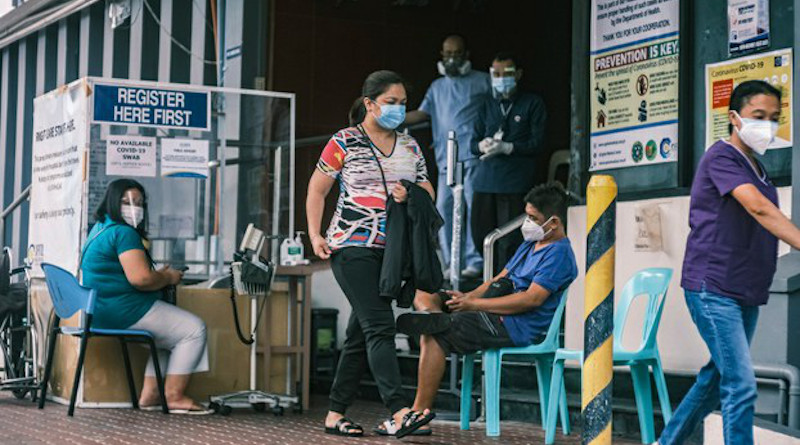‘More Infectious’ Strain Of Coronavirus Found In Philippines, Malaysia
By BenarNews
By Aie Balagtas See and Nisha David
A strain of COVID-19 common in Europe and the Americas has been detected in Malaysia and the Philippines and could lead to a spike in infections, authorities say.
In a joint statement on Tuesday, the Philippine Genome Center and the Research Institute for Tropical Medicine said samples of the variant were discovered in Quezon City, north of metropolitan Manila and home to about 2.9 million people.
“There is evidence that the mutation makes it easier for the virus to enter its target cell and may be associated with higher viral loads in infected persons. This likely translates into a higher level of infectivity,” the statement said, while cautioning that there was not yet definitive proof of this.
The D614G variant of the virus that causes COVID-19 has been associated with outbreaks in Europe and New York, and has been present in Singapore since February, according to reports.
The variant is only very slightly different from the strain of novel coronavirus that emerged in Wuhan, China in late 2019, but became the dominant form worldwide by March, scientists said.
The mutation “allows it to enter human cells the way a burglar picks a lock,” the Washington Post reported in July.
“At least five laboratory experiments suggest that the mutation makes the virus more infectious, although only one of those studies has been peer-reviewed,” it said.
In Manila, the Philippine Genome Center noted that testing for the new strain had been conducted only in Quezon City to date. Health department spokeswoman Maria Rosario Vergeire added that the sample size was too small to establish the extent of its presence in the Philippines.
Quezon City has recorded 8,755 COVID-19 infections and 363 COVID-19 deaths, according to health officials.
As of Tuesday, the Philippines logged 169,213 COVID-19 cases and 2,687 deaths. Globally, more than 22.9 million infections and 775,000 deaths have been recorded, according to disease experts at U.S.-based Johns Hopkins University.
The report comes a day after Philippine President Rodrigo Duterte announced that quarantine measures tightened in early August as infection rates soared would be eased again in Manila and neighboring provinces, including Quezon City, starting Wednesday.
Malaysian cases
On Sunday, Malaysia’s Director General of Health Noor Hisham Abdullah announced that four cases of the D614G variant had been found in Malaysia, in clusters linked to cases imported from India and the Philippines.
Fast-paced public health actions brought the clusters under control, he said, while warning that the new strain was “10 times” more infectious than the earlier variant.
“At the moment, the strain was only detected in three cases in the Sivagangga cluster and one in the Ulu Tiram cluster. We are still conducting tests on other samples from other clusters in the lab,” he told BenarNews on Tuesday.
Malaysia should close its borders again and limit interstate travel to respond to this development, said Gerard Lawrence, a primary care specialist at Global Doctors Hospital in Kuala Lumpur.
“Of course, this may affect our economy, but if we have a second wave pandemic with this ‘superbug,’ things will get so much worse,” Lawrence told BenarNews.
But Wang Linfa, director of the emerging infectious disease program at Duke-NUS Medical School in Singapore, said there was no scientific data to show that D614G was “more transferrable” or more deadly than the original version of the virus, the Straits Times reported.
“That particular mutant, D614G, was circulating around the world for a long time, since February, and we had it in Singapore … for the layman, they interpret this as more transmissible or more deadly, but that’s not true,” he said.
‘New phase’
Meanwhile, the Western Pacific regional director for the World Health Organization said the pandemic had entered a new phase in Asia.
“In this phase, countries are increasingly able to minimize large scale disruptions to people’s lives and economies by combining early detection and rapid responses to emerging infections, and people sticking to the prevention measures,” Dr. Takeshi Kasai told reporters on Tuesday.
At the same time, death and infection rates were accelerating all over the world, and “young, healthy people are increasingly driving its spread,” he said.
“Many are unaware they’re infected – with very mild symptoms or none at all. This can result in them unknowingly passing on the virus to others,” Kasai said, adding the efforts to control the coronavirus would depend “on the actions of governments and people across the region.”
“We must continue to refine, learn and adjust our response in pursuit of the ‘new normal,’ because COVID-19 will likely be with us for the foreseeable future,” he said.

